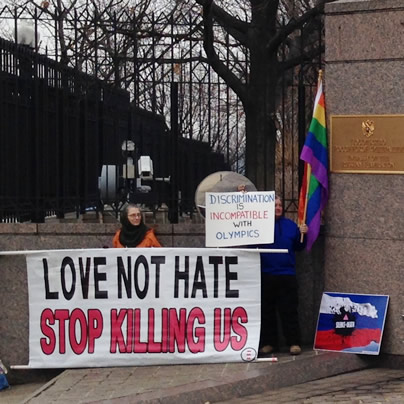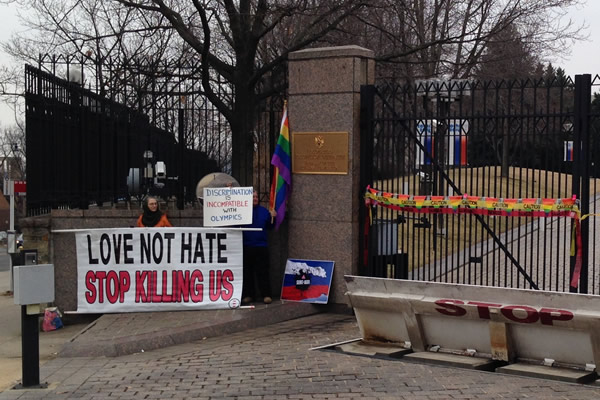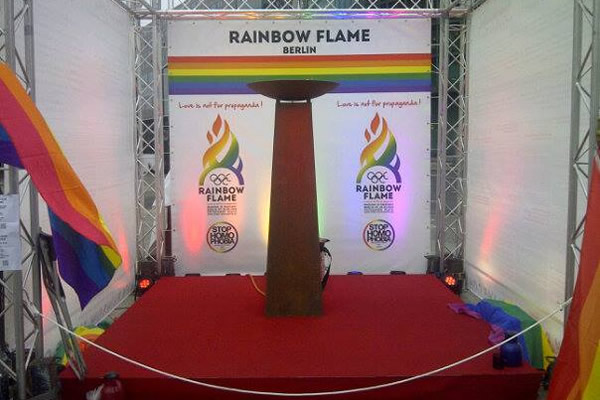National
Russian LGBT rights record overshadows Olympics
14 activists arrested before opening ceremony


Members of GetEQUAL on Feb. 9 protested outside the Russian embassy in Northwest D.C. (Photo courtesy of Cathy Kristofferson)
The 2014 Winter Olympics officially opened on Feb. 7 amid outrage over the arrest of 14 Russian LGBT rights advocates earlier in the day.
Police arrested 10 activists near Moscow’s Red Square who held rainbow and Russian flags as they sung the Russian national anthem just before the games opened in Sochi.
Elena Kostynchenko, who is among those taken into custody, told the Washington Blade during a telephone interview from Moscow on Feb. 8 that officers beat one activist and choked another once they arrived at a local police station.
She said authorities also threatened to sexually assault her and another female advocate. Kostynchenko told the Blade officers also made lewd comments about her body and spit in her face before her release.
“They didn’t care about anything,” said Kostynchenko.
St. Petersburg police earlier on Feb. 7 arrested Anastasia Smirnova and three other Russian LGBT rights advocates as they marched with a banner that read “discrimination is incompatible with the Olympic movement. Principle 6. Olympic charter” in reference to a campaign in support of adding sexual orientation to the Olympic charter.
Smirnova appeared on a U.N. panel in December that commemorated the 65th anniversary of the ratification of the Universal Declaration of Human Rights. She later took part in a Capitol Hill briefing on Russia’s LGBT rights record.
Smirnova told the Blade she and the three other activists faced additional harassment after St. Petersburg officials released them from custody on Feb. 7. She said it took them three hours before local police officers and other authorities allowed them to retrieve their car that had been towed.
“We are sorry to learn of the detention of activists in Russia for making political statements,” Aaron Jensen, a spokesperson for the Bureau of Democracy, Human Rights and Labor at the State Department, told the Blade after Russian police arrested Smirnova and the other LGBT rights advocates in St. Petersburg and Moscow. “This is an example of the disturbing trend in the Russian Federation of legislation, prosecutions, and government actions aimed at suppressing dissent and groups that advocate for human rights and government accountability.”
Florida Congresswoman Ileana Ros-Lehtinen is among those who also criticized the activists’ arrest.
“Tonight’s about solidarity,” said Ty Cobb, director of global engagement for the Human Rights Campaign, as he read an e-mail from Smirnova during an opening ceremony watch party his organization co-hosted with Team D.C., Capital Pride and Gays and Lesbians in Foreign Affairs Agencies and Pride House International that benefitted the Russian LGBT Sports Federation. “Let them know we stand in solidarity with them.”

Advocates showed their support for LGBT Russians in Berlin on Feb. 11. (Photo courtesy of David Ehinger)
Activists in New York, Philadelphia and nearly 40 other cities around the world held similar events during the opening ceremony. A handful of activists gathered outside the Russian embassy in Northwest D.C. on Feb. 9 to protest the Kremlin’s gay rights record.
Russian President Vladimir Putin told ABC News’ George Stephanopoulos last month those who protest his government’s LGBT rights record during the Olympics would not face prosecution under the country’s controversial law that bans gay propaganda to minors. The International Olympic Committee has repeatedly said it has received assurances from the Kremlin that gays and lesbians will not suffer discrimination during the games that are taking place in the Black Sea resort city of Sochi.
The Blade’s attempts to reach the Russian government for comment on the arrests were unsuccessful.
“We understand that the protesters were quickly released,” said IOC spokesperson Sandrine Tonge on Feb. 9. “As in many countries in the world, in Russia, you need permission before staging a protest. I understand this was the reason that they were temporarily detained.”
IOC President Thomas Bach said during his speech at the opening ceremony that people should “have the courage to address your disagreements in a peaceful” way and “not on the backs of these athletes.”
“Olympic games are always about building bridges about bringing people together,” he said before he and Putin officially opened the games. “Please respect the Olympic message of good will, of tolerance, of excellence, of peace.”
Bach also said it is possible for competitors “to live together under one roof in harmony, with tolerance and without any form of discrimination for whatever reason.” NBC omitted this portion of the speech from its broadcast of the opening ceremony.
Hudson Taylor, founder of Athlete Ally, spent several days in Sochi highlighting the campaign in support of adding sexual orientation to Principle 6 of the Olympic charter.
David Pichler, a gay U.S. diver who competed in the 1996 Summer Olympics and 2000 Summer Olympics in Atlanta and Sydney, told the Blade during a telephone interview from Sochi on Feb. 9 that he had not seen any athletes publicly speak out in support of LGBT rights. Gay figure skater Brian Boitano, lesbian hockey player Caitlin Cahow and former Secretary of Homeland Secretary Janet Napolitano are among the members of the U.S. Olympic delegation to the games.
“We haven’t been to a lot of the different games where somebody might try to flash a symbol,” said Pichler, who was in the Olympic host city with Shawn Gaylord and Mary Elizabeth Margolis of Human Rights First. “I imagine we would have heard if there had been something like that.”

From left: Mary Elizabeth Margolis and Shawn Gaylord of Human Rights First and Olympian David Pichler in front of the Olympic torch in Sochi, Russia. (Photo courtesy of Human Rights First)
The group visited a gay nightclub on Feb. 8 where they met with Andrei Ozyorny, a 24-year-old man who wrote to Sochi Mayor Anatony Pakhomov last month after he said there are no gay people in the city. Pichler, Gaylord and Margolis met with Smirnova and two other Russian LGBT rights advocates in St. Petersburg on Feb. 6 – one day before police arrested her and three other activists.
Pichler noted to the Blade an anti-LGBT protest took place in Sochi before the games officially opened.
“[It] is kind of contradictory of the standards of the protest zone and everything that was set up,” he said. “There was not anything negative or any type of action taken on them.”
LGBT rights advocates continue to target Coca-Cola and other Olympic sponsors for not criticizing Russia’s LGBT rights record – HRC served Coke and other Coca-Cola products during its opening ceremony watch party in D.C. Queer Nation NY on Feb. 10 criticized lesbian speed skater Ireen Wust after she said she had a “cuddle” with Putin after winning a gold medal for the Netherlands.
“The Olympic athletes have said that they will not make political statements during the Games yet that is exactly what Ireen Wust did,” said Queer Nation NY member Duncan Osborne. “By embracing Vladimir Putin, a man who has trampled on the human rights of LGBT Russians, political dissidents, artists, undocumented immigrants, and others in Russia, Wust has endorsed his fascist agenda.”
Kansas
ACLU sues Kansas over law invalidating trans residents’ IDs
A new Kansas bill requires transgender residents to have their driver’s licenses reflect their sex assigned at birth, invalidating current licenses.

Transgender people across Kansas received letters in the mail on Wednesday demanding the immediate surrender of their driver’s licenses following passage of one of the harshest transgender bathroom bans in the nation. Now the American Civil Liberties Union is filing a lawsuit to block the ban and protect transgender residents from what advocates describe as “sweeping” and “punitive” consequences.
Independent journalist Erin Reed broke the story Wednesday after lawmakers approved House Substitute for Senate Bill 244. In her reporting, Reed included a photo of the letter sent to transgender Kansans, requiring them to obtain a driver’s license that reflects their sex assigned at birth rather than the gender with which they identify.
According to the reporting, transgender Kansans must surrender their driver’s licenses and that their current credentials — regardless of expiration date — will be considered invalid upon the law’s publication. The move effectively nullifies previously issued identification documents, creating immediate uncertainty for those impacted.
House Substitute for Senate Bill 244 also stipulates that any transgender person caught driving without a valid license could face a class B misdemeanor, punishable by up to six months in jail and a $1,000 fine. That potential penalty adds a criminal dimension to what began as an administrative action. It also compounds the legal risks for transgender Kansans, as the state already requires county jails to house inmates according to sex assigned at birth — a policy that advocates say can place transgender detainees at heightened risk.
Beyond identification issues, SB 244 not only bans transgender people from using restrooms that match their gender identity in government buildings — including libraries, courthouses, state parks, hospitals, and interstate rest stops — with the possibility for criminal penalties, but also allows for what critics have described as a “bathroom bounty hunter” provision. The measure permits anyone who encounters a transgender person in a restroom — including potentially in private businesses — to sue them for large sums of money, dramatically expanding the scope of enforcement beyond government authorities.
The lawsuit challenging SB 244 was filed today in the District Court of Douglas County on behalf of anonymous plaintiffs Daniel Doe and Matthew Moe by the American Civil Liberties Union, the ACLU of Kansas, and Ballard Spahr LLP. The complaint argues that SB 244 violates the Kansas Constitution’s protections for personal autonomy, privacy, equality under the law, due process, and freedom of speech.
Additionally, the American Civil Liberties Union filed a temporary restraining order on behalf of the anonymous plaintiffs, arguing that the order — followed by a temporary injunction — is necessary to prevent the “irreparable harm” that would result from SB 244.
State Rep. Abi Boatman, a Wichita Democrat and the only transgender member of the Kansas Legislature, told the Kansas City Star on Wednesday that “persecution is the point.”
“This legislation is a direct attack on the dignity and humanity of transgender Kansans,” said Monica Bennett, legal director of the ACLU of Kansas. “It undermines our state’s strong constitutional protections against government overreach and persecution.”
“SB 244 is a cruel and craven threat to public safety all in the name of fostering fear, division, and paranoia,” said Harper Seldin, senior staff attorney for the ACLU’s LGBTQ & HIV Rights Project. “The invalidation of state-issued IDs threatens to out transgender people against their will every time they apply for a job, rent an apartment, or interact with police. Taken as a whole, SB 244 is a transparent attempt to deny transgender people autonomy over their own identities and push them out of public life altogether.”
“SB 244 presents a state-sanctioned attack on transgender people aimed at silencing, dehumanizing, and alienating Kansans whose gender identity does not conform to the state legislature’s preferences,” said Heather St. Clair, a Ballard Spahr litigator working on the case. “Ballard Spahr is committed to standing with the ACLU and the plaintiffs in fighting on behalf of transgender Kansans for a remedy against the injustices presented by SB 244, and is dedicated to protecting the constitutional rights jeopardized by this new law.”
National
After layoffs at Advocate, parent company acquires ‘Them’ from Conde Nast
Top editorial staff let go last week

Former staff members at the Advocate and Out magazines revealed that parent company Equalpride laid off a number of employees late last week.
Those let go included Advocate editor-in-chief Alex Cooper, Pride.com editor-in-chief Rachel Shatto, brand partnerships manager Erin Manley, community editor Marie-Adélina de la Ferriére, and Out magazine staff writers Moises Mendez and Bernardo Sim, according to a report in Hollywood Reporter.
Cooper, who joined the company in 2021, posted to social media that, “Few people have had the privilege of leading this legendary LGBTQ+ news outlet, and I’m deeply honored to have been one of them. To my team: thank you for the last four years. You’ve been the best. For those also affected today, please let me know how I can support you.”
The Advocate’s PR firm when reached by the Blade said it no longer represents the company. Emails to the Advocate went unanswered.
Equalpride on Friday announced it acquired “Them,” a digital LGBTQ outlet founded in 2017 by Conde Nast.
“Equalpride exists to elevate, celebrate and protect LGBTQ+ storytelling at scale,” Equalpride CEO Mark Berryhill said according to Hollywood Reporter. “By combining the strengths of our brands with this respected digital platform, we’re creating a unified ecosystem that delivers even more impact for our audiences, advertisers, and community partners.”
It’s not clear if “Them” staff would take over editorial responsibilities for the Advocate and Out.
Federal Government
Two very different views of the State of the Union
As Trump delivered his SOTU address inside the Capitol, Democratic lawmakers gathered outside in protest, condemning the administration’s harmful policies.

As President Donald Trump delivered his State of the Union address inside the U.S. Capitol — touting his achievements and targeting political enemies — progressive members of Congress gathered just outside in protest.
Their message was blunt: For many Americans, particularly LGBTQ people, the country is not better off.
Each year, as required by Article II, Section 3 of the Constitution, the president must “give to the Congress Information of the State of the Union.” The annual address is meant to outline accomplishments and preview the year ahead. This year, Trump delivered the longest State of the Union in U.S. history, clocking in at one hour and 48 minutes. He spoke about immigration, his “law and order” domestic agenda, his “peace through strength” foreign policy doctrine, and what he framed as the left’s ‘culture wars’ — especially those involving transgender youth and Christian values.
But one year into what he has called the “Trump 2.0” era, the picture painted outside the Capitol stood in stark contrast to the one described inside.
Transgender youth
In one of the most pointed moments of his speech, Trump spotlighted Sage Blair, using her story to portray gender-affirming care as coercive and dangerous. Framing the issue as one of parental rights and government overreach, he told lawmakers and viewers:
“In the gallery tonight are Sage Blair and her mother, Michelle. In 2021, Sage was 14 when school officials in Virginia sought to socially transition her to a new gender, treating her as a boy and hiding it from her parents. Hard to believe, isn’t it? Before long, a confused Sage ran away from home.
“After she was found in a horrific situation in Maryland, a left-wing judge refused to return Sage to her parents because they did not immediately state that their daughter was their son. Sage was thrown into an all-boys state home and suffered terribly for a long time. But today, all of that is behind them because Sage is a proud and wonderful young woman with a full ride scholarship to Liberty University.
“Sage and Michelle, please stand up. And thank you for your great bravery and who can believe that we’re even speaking about things like this. Fifteen years ago, if somebody was up here and said that, they’d say, what’s wrong with him? But now we have to say it because it’s going on all over, numerous states, without even telling the parents.
“But surely, we can all agree no state can be allowed to rip children from their parents’ arms and transition them to a new gender against the parents’ will. Who would believe that we’ve been talking about that? We must ban it and we must ban it immediately. Look, nobody stands up. These people are crazy. I’m telling you, they’re crazy.”
The story, presented as encapsulation of a national crisis, became the foundation for Trump’s renewed call to ban gender-affirming care. LGBTQ advocates — and those familiar with Blair’s story — argue that the situation was far more complex than described and that using a single anecdote to justify sweeping federal restrictions places transgender people, particularly youth, at greater risk.
Equality Virginia said the president’s remarks were part of a broader effort to strip transgender Americans of access to care. In a statement to the Blade, the group said:
“Tonight, the president is choosing to double down on efforts to disrupt access to evidence-based, lifesaving care.
“Rather than allowing families and doctors to navigate deeply personal medical decisions free from federal interference — or allowing schools to respond with nuance and compassion without putting marginalized children at risk — the president is instead advocating for reckless, one-size-fits-all political control.
“At a time when Virginians are worried about rising costs, economic uncertainty, and aggressive immigration enforcement actions disrupting communities and families, attacking transgender young people is a blatant political distraction from the real challenges facing our nation. Virginia families and health care providers do not need Donald Trump telling them what care they do or do not need.”
For many in the LGBTQ community, the rhetoric inside the chamber echoed actions already taken by the administration.
Earlier this month, the Pride flag was removed from the Stonewall National Monument under a National Park Service directive that came from the top. Community members returned to the site, raised the flag again, and filed suit, arguing the removal violated federal law. To advocates, the move was symbolic — a signal that even the legacy of LGBTQ resistance was not immune.
Immigration and fear
Immigration dominated both events as well.
Inside the chamber, Trump boasted about the hundreds of thousands of immigrants detained in makeshift facilities. Outside, Democratic lawmakers described those same facilities as concentration camps and detailed what they characterized as the human toll of the administration’s enforcement policies.
Sen. Ed Markey (D-Mass.), speaking to the crowd, painted a grim picture of communities living in fear:
“People are vanishing into thin air. Quiet mornings are punctuated by jarring violence. Students are assaulted by ICE agents sitting outside the high school, hard working residents are torn from their vehicles in front of their children. Families, hopelessly search for signs of their loved ones who have stopped answering their phones, stop replying to text… This is un-American, it is illegal, it is unconstitutional, and the people are going to rise up and fight for Gladys Vega and all of those poor people who today need to know that the people’s State of the Union is the beginning of a long fight that is going to result in the end of Republican control of the House of Representatives and the Senate in the United States of America in 2026.”
Speakers emphasized that LGBTQ immigrants are often especially vulnerable — fleeing persecution abroad only to face detention and uncertainty in the United States. For them, the immigration crackdown and the attacks on transgender health care are not separate battles but intertwined fronts in a broader cultural and political war.
Queer leadership

After delivering remarks alongside Robert Garcia, Kelley Robinson, president of the Human Rights Campaign, took the stage and transformed the freezing crowd’s anger into resolve.
Garcia later told the Blade that visibility matters in moments like this — especially when LGBTQ rights are under direct attack.
“We should be crystal clear about right now what is happening in our country,” Garcia said. “We have a president who is leading the single largest government cover up in modern history, we have the single largest sex trafficking ring in modern history right now being covered up by Donald Trump and Pam Bondi In the Department of Justice. Why are we protecting powerful, wealthy men who have abused and raped women and children in this country? Why is our government protecting these men at this very moment? In my place at the Capitol is a woman named Annie farmer. Annie and her sister Maria, both endured horrific abuse by Jeffrey Epstein and Ghislaine Maxwell. As we move forward in this investigation, always center the survivors; we are going to get justice for the survivors. And Donald Trump may call this investigation a hoax. He may try to deflect our work, but our message to him is very clear that our investigation is just getting started, and we will we will get justice for these survivors.”
He told the Blade afterwards that having queer leaders front and center is itself an act of resistance.
“I obviously was very honored to speak with Kelley,” the California representative said. Kelley is doing a great job…it’s important that there are queer voices, trans voices, gay voices, in protest, and I think she’s a great example of that. It’s important to remind the country that the rights of our community continue to be attacked, and then we’ve got to stand up. Got to stand up for this as well.”
Robinson echoed that call, urging LGBTQ Americans — especially young people — not to lose hope despite the administration’s escalating rhetoric.
“There are hundreds of thousands of people that are standing up for you every single day that will not relent and will not give an inch until every member of our community is protected, especially our kids, especially our trans and queer kids. I just hope that the power of millions of voices drowns out that one loud one, because that’s really what I want folks to see at HRC. We’ve got 3.6 million members that are mobilizing to support our community every single day, 75 million equality voters, people that decide who they’re going to vote for based on issues related to our community. Our job is to make sure that all those people stand up so that those kids can see us and hear our voices, because we’re going to be what stands in the way.”
A boycott — and a warning
The list of Democratic lawmakers who boycotted the State of the Union included Sens. Ruben Gallego, Ed Markey, Jeff Merkley, Chris Murphy, Adam Schiff, Tina Smith, and Chris Van Hollen, along with dozens of House members.
For those gathered outside — and for viewers watching the livestream hosted by MoveOn — the counter-programming was not merely symbolic. It was a warning.
While the president spoke of strength and success inside the chamber, LGBTQ Americans — particularly transgender youth — were once again cast as political targets. And outside the Capitol, lawmakers and advocates made clear that the fight over their rights is far from over.

-

 Mexico5 days ago
Mexico5 days agoUS Embassy in Mexico issues shelter in place order for Puerto Vallarta
-

 Netherlands4 days ago
Netherlands4 days agoRob Jetten becomes first gay Dutch prime minister
-

 Sports4 days ago
Sports4 days agoMore than a dozen LGBTQ athletes medal at Olympics
-

 Books3 days ago
Books3 days agoNew book profiles LGBTQ Ukrainians, documents war experiences

















